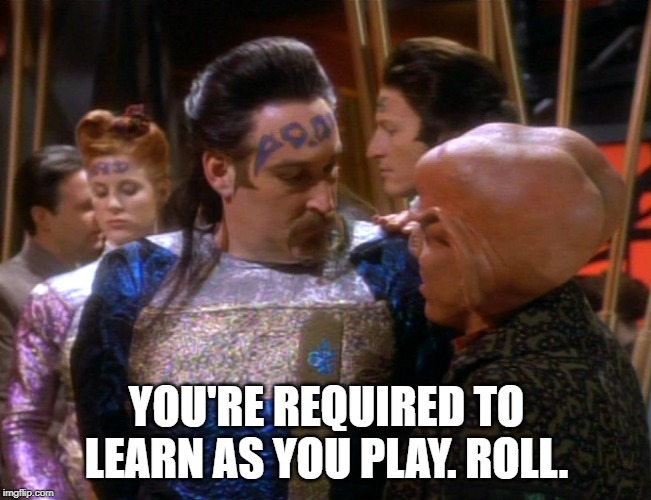One thing that some gamers have long questioned, but so many more have left unquestioned (to the extent that the situation has become the norm in most RPGs) is the fact that character creation comes first in the rules.
It’s been that way since the very beginning. In the first of the LBBs, we get a paragraph on “what is needed for the campaign”, which is essentially a brief outline of the concept of map and key and dungeon. After that, we launch straight into the types of characters and how they’re created. Only much later do we get into combat, and magic, and the rest.
Holmes Basic follows the same pattern, with “Creating Characters” on the very first page of rules. AD&D followed suit, starting with descriptions of ability scores and how they’re rolled, then going into race and class. Then equipment that can be bought! Only much later do we get an inkling of the combat system (which isn’t actually explained until the DMG, which came out a full two years after the Players Handbook), and magic. The same basic structure has been used in every edition of D&D and AD&D since.
Some people find that a great fault with the organization of the game, saying that the mechanics of the game should come first, so that players can make informed decisions when they finally get to create a character.
I think the reality is much different. I think the notion that one creates a character first, and only then finds out what the mechanics of the rules are, is intentional, and actually beneficial.
Recall that the genesis of the game was very different than that which we played, both as envisioned by Arneson and Gygax. In the very earliest days, nobody had a DMG to lay out magic items. Nobody knew what the armor class of a troll was. Nobody knew what spells could be found on a scroll were, or what they could do. It was all the unknown.
The greater part of the game, in essence, was learning the rules. Who cares what the best weapon is on a gp-to-average-damage ratio? Who cares which combination of multi-classes can give you the “best build”? Grab some dice, roll up a character, and learn as you go.
I think this ethos is something that was built into the original game, and which has stayed with it and most of the others that came after it, even if it was completely unconsciously so. I personally think that’s a good thing, eliminating as it does the temptation to do a “killer build” that maximizes the character in terms of damage it can do. It gives more opportunity for emphasizing the role-playing aspects when one is not only unconcerned, but generally ignorant, of the mechanics of the game.
I personally think that’s not the worst thing that could be.










Do the people that think “the mechanics of the game should come first, so that players can make informed decisions when they finally get to create a character.” realize that it is possible to read the whole book before generating characters?
I can see an argument for playing a pre-generated character first to see how everything works but I’ve always been partial to having the generation rules at the start, it just seems natural.
In real life your character is generated long before you learn the rules. Just saying. 😛
Tru dat! 😀
As a fan of sub-optimal / non min-maxed characters I definitely agree on the last point! Killer builds are mechanically great but often dull to play (at the same table as) because they sacrifice flavour. All characters benefit from flaws and weaknesses!